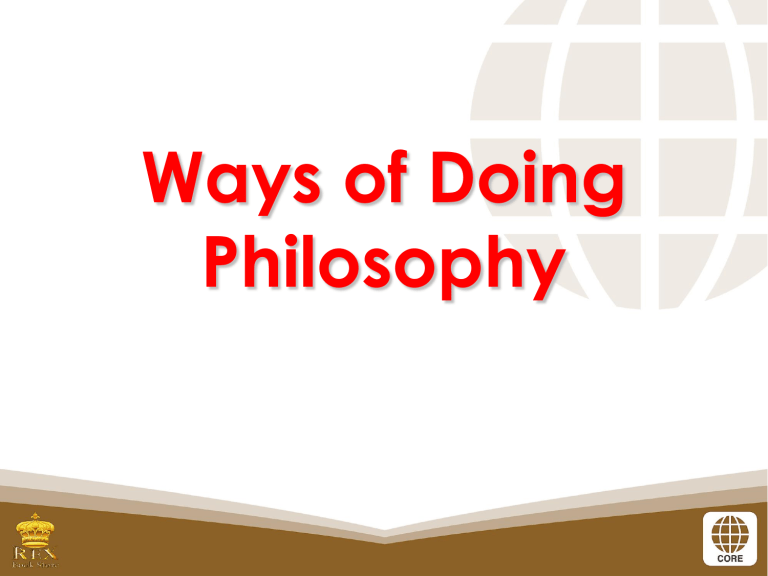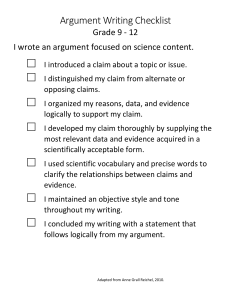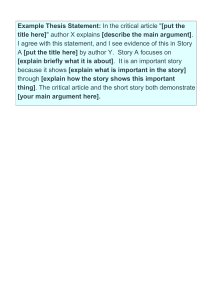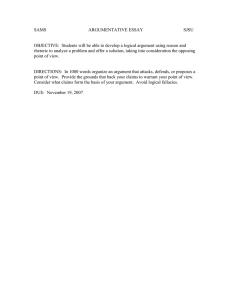
Ways of Doing Philosophy Lesson Objectives • Distinguish opinion from truth • Analyze situations that show the difference Key Questions • What are the different ways of doing philosophy? • How can philosophy guide us in distinguishing opinion from truth? TRUTH VS. OPINION • • • • There is a dozen of eggs in my refrigerator. Chocolate tastes better than milk. The earth revolves around the sun. The earth was created by an omnipotent God. • Liza Soberano is beautiful. • There was an old man who lived by himself. He felt tired so he went into the bathroom , went to the toilet , and then turned the light off before going to bed. The next morning there was a news flash on the radio that a boat crashed. The man opened the window and jumped out. Why? What is TRUTH ? • A. Phenomenology • B. Existentialism • C. Postmodernism • D. Logic Methods of Philosophizing • Philosophizing is to think or express oneself in a philosophical manner. discusses a matter from a philosophical standpoint Phenomenology: On Consciousness • Phenomenology was founded by Edmund Husserl. • A method for finding and guaranteeing the truth that focuses on careful inspection and description of phenomena or appearances. • It comes form the Greek word phainómenon meaning “appearance.” • It is the scientific study of the essential structures of consciousness. Methods of Philosophizing • Husserl’s phenomenology is the thesis that consciousness is intentional (intentionality) • Every act of consciousness is directed at some object or another, possibly a material object or an “ideal” object. • The phenomenologist can describe the content of consciousness and accordingly, the object of consciousness without any particular commitment to the actuality or existence of that object. • Phenomenology uncovers the essential structures of experience and its objects. Methods of Philosophizing Existentialism: On Freedom • Existentialism is not primarily a philosophical method nor is it exactly a set of doctrines but more of an outlook or attitude supported by diverse doctrines centered on certain common themes. the human condition or the relation of the individual to the world; the human response to that condition; being, especially the difference between the being of person (which is “existence”) and the being of other kinds of things; human freedom; Methods of Philosophizing the significance (and unavoidability) of choice and decision in the absence of certainty and; the concreteness and subjectivity of life as lived, against abstractions and false objectifications. • Existentialism emphasizes the importance of free individual choice, regardless of the power of other people to influence and coerce our desires, beliefs, and decisions. • To be human, to be conscious, is to be free to imagine, free to choose, and responsible for one’s life. • One of the continuing criticisms of existentialism is the obscurity and the seeming elusiveness of the ideal of authenticity. Methods of Philosophizing Postmodernism: On Cultures • Postmodernism is not a philosophy. • “Postmodernism” has come into vogue as the name for a rather diffuse family of ideas and trends that in significant respect rejects, challenges, or aims to supersede “modernity”. • Postmodernists believe that humanity should come at truth beyond the rational to the non-rational elements of human nature, including the spiritual. • Beyond exalting individual analysis of truth, postmodernists adhere to a relational, holistic approach. Methods of Philosophizing Logic and Critical Thinking: Tools in Reasoning • Logic is centered in the analysis and construction of arguments. • Critical thinking is distinguishing facts and opinions or personal feelings. • Critical thinking also takes into consideration cultural systems, values, and beliefs and helps us uncover bias and prejudice and be open to new ideas not necessarily in agreement with previous thought. • Two basic types of reasoning: Inductive reasoning which is based from observations in order to make generalizations. Methods of Philosophizing • • • • Deductive reasoning which draws conclusion from usually one broad judgment or definition and one more specific assertion, often an inference. An argument (deductive argument) is valid and sound if it is a product of logically constructed premises. Validity comes from a logical conclusion based on logically constructed premises. An argument (inductive argument) is strong if it provides probable support to the conclusion. A strong argument with true premises is said to be cogent. Validity and Soundness of an Argument All philosophers are wise. (major premise) Confucius is a philosopher. (minor premise) Therefore, Confucius is wise . (Conclusion) Based on the previous example, if the two premise are constructed logically, then the conclusion must follow logically, the deductive argument is valid. This does not necessarily mean that the conclusion is true or false. Validity comes from a logical conclusion based on logically constructed premises (Reed 2010) Methods of Philosophizing Fallacies • A fallacy is a defect in an argument. • Fallacies are detected by examining the contents of the argument. • Common fallacies Appeal to pity (Argumentum ad misericordiam) An attempt to win support for an argument or idea by exploiting his or her opponent’s feelings of pity or guilt. Appeal to ignorance (Argumentum ad ignorantiam) What has not been proven false must be true and vice versa. Methods of Philosophizing Equivocation A logical chain of reasoning of a term or a word several times, but giving the particular word a different meaning each time. Composition Something is true of the whole from the fact that it is true of some part of the whole. Division Something true of a thing must also be true of all or some of its parts. Against the Person (Argumentum ad hominem) It links the validity of a premise to a characteristic or belief of the person advocating the premise. Methods of Philosophizing Appeal to force (Argumentum ad baculum) An argument where force, coercion, or the threat of force is given as a justification for a conclusion. Appeal to the people (Argumentum ad populum) An argument that appeals or exploits people’s vanities, desire for esteem, and anchoring on popularity. False cause (post hoc) Since that event followed this one, that event must have been caused by this one. Hasty generalization Making an inductive generalization based on insufficient evidence. DEBATE TOPIC • IS TELEVISION AN EFFECTIVE TOOL IN BUILDING THE MINDS OF CHILDREN? Activities 1. How can truth have different interpretations? 2. Share your experiences on the times you did not use reason in your life but rather, you relied more on emotions or opinions of other people. What did you learn from the experience? 3. Cite examples of how fallacies are used in daily life. For example, when you watch advertisements based on the popularity of endorsers, do you tend to buy their products?




